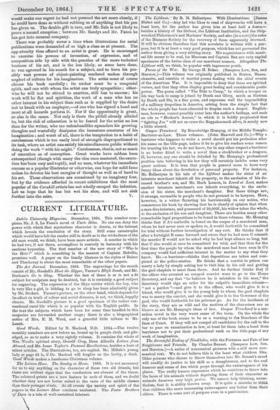Gaspar 7'renchard. By Bracebridge Hemyng, of the Middle Templet Barrister-at-Law.
Three volumes. (John Maxwell and Co.)—Why a barrister who happens to write a novel should put his profession after his name on the title-page, unless it be to give his readers some reason for trusting his law, we do not know, for in any other respect a barrister is no better fitted to write a novel than a stockbroker or a dragoon. If, however, any one should be deluded by Mr. Hemyng's professional position into believing in his law they will certainly imbibe some very queer notions. It is true that people in general seem to have very funny ideas about the devolution of personal property. For instance, Mr. Ballantyne in his tale of the Lifeboat makes the sister of an intestate merchant inherit all his property, to the exclusion of his de- ceased brother's son, and Mr. Mark Lemon, in Loved at Last, makes another intestate merchant's son inherit everything, to the exclu- sion of his sister, the merchant's daughter. But these things are, if strange, excusable in people who do not pretend to be lawyers. Here, however, is a writer thrusting his barristership on our notice, who commences his book by showing that he is clearly of opinion that when a man dies intestate, and possessed of 30,0001., his widow takes the whole, to the exclusion of his son and daughter. There are besides many other remarkable legal propositions to be found in these volumes. Mr. Hemyng thinks that if A's umbrella is found on the corpse of a murdered man, whom he had never seen or spoken to, A would forthwith be committed for trial without further investigation of any sort. He thinks that if after a fortnight B came forward and swore that he had seen C commit the murder B would not be asked why he had kept silence so long, but that C also would at once be committed for trial, and that then for the first time the people by whom tho murdered man had been seen in 0's company would feel sufficient interest in the matter to say what they knew. He —a barrister—thinks that depositions are taken and com- pleted at the police-station. He thinks that a convict in prison can marry a lady by simply asking her to visit him in his cell and getting the gaol chaplain to meet them there. And he farther thinks that if the officer who arrested an escaped convict wore to go to tho Homo Secretary, and say that "he believes he is mistaken in his man," the Secretary would sign an order for the culprit's immediate release- " not a pardon "—and give it to tho officer, who would give it to a friend, who would give it to the young lady to whom the gaol chaplain was to marry the convict, and she would give it to the Governor of the gaol, who would forthwith let his prisoner go. As for the incidents of the story, they are as wild and the motives of the characters are as bizarre as are Mr. Hemyng's ideas of law. Gaspar Trenchard is a sen- sation novel in the very worst sense of the term. On the whole the only use of the book seems to be as a warning to the Benchors of the Inns of Court. If they will not compel all candidates for the call to the bar to pass an examination in law, at least let them take a bond from barristers not to put their professional rank on the title-page of any work of imagination.






























 Previous page
Previous page